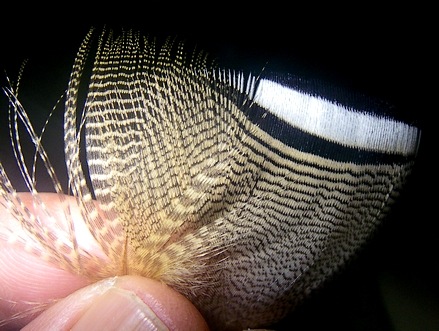As a follow up to this morning’s post, here is the final feather coloration after it’s been dried completely.

That’s a superb match. The real lesson is compensating for water’s darkening effect, the extra shades you allow knowing how much lighter the color will be the morning.
There’s only one real way to learn how to avoid a three-shade mistake and it involves destroying an awful lot of Mallard flank.
Like I did.
It’s cheap so it shouldn’t give you much pause. Stick to inexpensive materials to learn the craft, and remember that “less is more” when it comes to matching Mother Nature. You need weak dye baths that buy you the time to watch the feather color.
Tags: Wood Duck flank, lemon yellow, Mallard, weak dye bath

The mallard that you’ll inevitably ruin still ties perfectly good Staynor Ducktails.
I wanted to make it sound painful and sinister, but you’re quite right.
… a couple weeks later you’re handing a half dozen flies to some guy on the creek – you’re catching and he’s not … and he exclaims, “how’d you get them orange tips on that tan Mallard, Sweet ..”
A meathead egoist spends an hour talking physics, I just tell them “the goddamn dye bath was too hot.”
… which was the Lord’s truth.